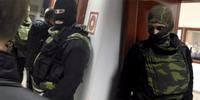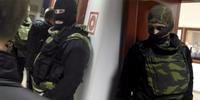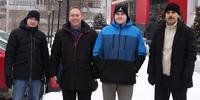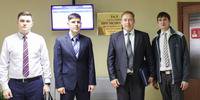Case of Karimov and Others in Naberezhnye Chelny
Filter
- #
In Tatarstan, investigators are opening a criminal case on the participation of several people in the services of Jehovah's Witnesses, considering this to be a continuation of the activities of religious organizations banned in Russia.
- #
In Naberezhnye Chelny, security forces raided and searched at least 10 apartments of local residents who are suspected of practicing the religion of Jehovah's Witnesses. Two people were arrested and taken into custody: Vladimir Myakushin and Konstantin Matrashov.
- #
Two days after the raids, another young man, Aidar Yulmetyev, was arrested.
The court chooses a measure of restraint for Ilham Karimov in the form of detention.
- #
- #
The court officially detains Yulmetyev.
- #
- #
All four detainees were charged with participation in an extremist organization.
- #
The Supreme Court of Tatarstan orders to release Ilham Karimov under house arrest. He leaves the pre-trial detention center a week after the court decision, having served 160 days in the detention center.
- #
- #
The Republican Supreme Court decides to release the remaining defendants in the case under house arrest.
- #
Vladimir Myakushin and Aidar Yulmetyev leave the pre-trial detention center, where they spent 170 days. Matrashov is released later - because of paperwork.
- #
- #
Matrashov, Yulmetyev and Karimov have been released from house arrest.
- #
The head of the Investigative Directorate of the Investigative Committee for Tatarstan withdraws the case from the investigators of Naberezhnye Chelny and transfers it to the department for the investigation of especially important cases.
- #
Matrashov gives a written undertaking not to leave.
- #
The court softens Yulmetyev, Myakushin and Karimov's measure of restraint, releasing them on their own recognizance.
- #
Karimov is accused of organizing a community banned in Russia.
- #
Matrashov is accused of being one of the leaders of a banned organization.
- #
Yulmetyev is ranked among the organizers of the extremist community. He has been charged accordingly.
- #
All four receive one copy of the indictment, which is not signed by either the investigator or the prosecutor and does not contain the date of its approval by the prosecutor.
- #
All four apply with written applications to the prosecutor of the Republic of Tatarstan with applications for obtaining indictments with obvious violations of the norms of the Code of Criminal Procedure.
On 31.10.2019, a preliminary hearing is scheduled in the Naberezhnye Chelny City Court. The first main meeting is scheduled for 07.11.2019.
- #
The Naberezhnye Chelny City Court refuses to consider the case and returns it to the prosecutor of the Republic of Tatarstan. In the ruling, the court draws attention to the fact that the investigators handed the defendants one text of the charge, and presented another to the court with a significantly expanded charge. In addition, the investigation, followed by the prosecutor's office, qualified the actions of believers under parts 1 and 2 of Article 282.2 of the Criminal Code of the Russian Federation completely arbitrarily, clearly not understanding what, in fact, their "crime" was. Despite the court's bold decision to return the case, the believers remain under recognizance not to leave. The case against them has not been closed.
- #
- #
The head of the first department for the investigation of especially important cases of the Investigative Committee in the Republic of Tatarstan, Colonel of Justice Ramil Bilalov appoints the composition of the investigation team of 9 people in the criminal case of Karimov, Matrashov, Yulmetyev and Myakushin (No. 11802920009000256) under the leadership of senior investigator S. R. Gimadeev. The investigation claims that the believers "organized the activities of the religious organization Jehovah's Witnesses and participated in its activities."
- #
Senior investigator S. R. Gimadeev summons all four believers and their defenders to be prosecuted. However, the investigative action is not carried out in connection with the non-arrival of the investigator in Naberezhnye Chelny. Believers are filing petitions to suspend the preliminary investigation in connection with the coronavirus infection.
- #
Senior investigator of the Investigative Committee S. R. Gimadeev decides to bring Ilham Karimov as a defendant under Part 1 of Article 282.2 of the Criminal Code of the Russian Federation. There are no victims in the criminal case, and the indictment does not provide factual evidence of the guilt of the accused. The investigation claims that the believers "participated in agitation, used methods of conspiracy, and promoted their exclusivity." Major of Justice A.B. Aldivanov interrogates Ilham Karimov. The accused pleaded not guilty. The believer asks to consider a petition to suspend the preliminary investigation in connection with the coronavirus infection.
- #
It becomes known that the investigator filed motions to limit the time to familiarize himself with the case materials against Myakushin, Matrashov, Karimov and Yulmetyev, which deprives them of the opportunity to prepare well for the defense. Believers prepare and send their objections to the court through the electronic reception.
- #
The court postpones consideration of objections until June 29 so that the defendants can send the original documents to the court.
- #
The Prosecutor of the Republic of Tatarstan Ildus Nafikov approves the indictment against Aidar Yulmetyev, Vladimir Myakushin, Konstantin Matrashov and Ilham Karimov.
- #
The indictment is handed over against receipt to all believers, although some of them are quarantined at home.
- #
The Naberezhnye Chelny City Court of the Republic of Tatarstan is holding the first hearing in the case of four believers. At the request of the investigator and the prosecutor, the judge shall grant his or her challenge. The case will be transferred to another judge.
- #
13 people come to support the believers. Judge Rustam Khakimov rejects the application for their admission due to the epidemiological situation. The court denies Karimov and Yulmetyev the right to defend themselves without appointed lawyers.
The Court grants the request to attach the Resolution of the Committee of Ministers of the Council of Europe on the complaints of Jehovah's Witnesses.
- #
The state prosecutors in the case are E. N. Lizunov and I. N. Davletshin. The court examines the materials of the case.
S. E. Zheleznyak, an employee of the Episcopal Metochion of the Holy Ascension Cathedral, a graduate of St. Tikhon's University, is interrogated as a witness. He informs the court that he does not personally know the defendants. He claims that the Orthodox faith is true, and the religion of Jehovah's Witnesses is false.
The former head of Vladimir Myakushin characterizes the defendant as a good worker, an honest and conflict-free person.
- #
The court interrogates FSB operative A.V. Kharisov, who reports that he is not aware of any evidence that Jehovah's Witnesses have ever been prosecuted for crimes such as drug trafficking, violent acts, and damage to someone else's property.
The court continues to study the case materials. It is established that at least 10 examinations of audio and video materials were carried out with the participation of witnesses who were not warned of criminal liability under Articles 307-308 of the Code of Criminal Procedure of the Russian Federation.
The Court has rejected a number of defence motions to identify the identity of a secret witness and to question him normally. The participants in the trial believe that he is an FSB agent A. R. Sagiyev, who portrayed an interest in the Bible.
- #
Five co-religionists of the defendants are being interrogated. They report that after the decision of the Supreme Court of the Russian Federation of April 20, 2017, "their faith has not gone away," they met to pray together, sing songs, study the Bible, and visit each other. One witness says that although her husband does not share her religious beliefs, she was not forced to dissolve the marriage by any of Jehovah's Witnesses.
- #
The court interrogates a secret witness. Answering questions from the defense, he reports that he attended services of Jehovah's Witnesses. Although he and his relatives have not been threatened, he wants to be interrogated as a secret witness.
- #
20 people come to the court session, but they are not allowed into the courthouse.
The lawyer reads out the characteristics of the defendants. Vladimir Myakushin and Konstantin Matrashov have positive characteristics from the place of work, gratitude from employers for conscientious work, neighbors speak of them as friendly respectable tenants. The employer describes Myakushin: "He is a peaceful person, he has never noticed statements encouraging violence and other illegal actions against citizens of another faith, he is a reliable comrade, sociable, professional."
Matrashov's employer describes Konstantin as an executive employee: "He participates in the public life of the enterprise, he has no conflicts with employees, including on religious grounds, he did not call for the destruction of the state system, he did not call for his family. The labor collective treated the arrest of Matrashov as an unfair decision.
- #
A witness who communicated with Jehovah's Witnesses personally and attended their services is being interrogated. She says that despite the fact that she professes a different religion, she has never experienced hatred or hostility from Jehovah's Witnesses.
- #
The judge attaches to the case file a description from Matrashov's place of work, signed by the company's employees.
In court, Matrashov's colleague says that Konstantin saved his life: when he had a heart attack, the believer took him to intensive care.
Vladimir Myakushin's neighbor is being interrogated. He positively characterizes the believer and emphasizes that as a university teacher, he communicates a lot with students and sees a striking difference between the highly moral lifestyle of Vladimir and today's youth.
- #
The court interrogates Myakushin, Matrashov, Yulmetyev and Karimov. They report that they attended worship services on their own initiative, and have no religious hatred towards anyone.
The Court examines video and audio recordings of worship services in which those present discuss the importance of tolerating the views and beliefs of others.
- #
The defense is filing a number of motions. The court rejects the petitions for recognition of the searches as illegal, for the appointment of a comprehensive linguistic and religious examination, for the inclusion of the Protocol of the Public Trial of Jehovah's Witnesses for 1962, the brochure "The Bible for the Youngest", video recordings of planting banned publications of Jehovah's Witnesses in their Kingdom Halls.
The court satisfies the defense's request to search for the lost documents by the decision to terminate the criminal case, as well as the request to attach the opinion of the UN Working Group on Arbitrary Detention (WGAD).
- #
The prosecutor asks Vladimir Myakushin to be sentenced to 8 years in a penal colony, and Aidar Yulmetyev, Ilham Karimov and Konstantin Matrashov to 7 years in a penal colony.
Such a severe request of the prosecutor is at odds with the explanation of the Plenum of the Supreme Court of the Russian Federation of October 28, 2021 that the divine services of Jehovah's Witnesses, their joint rituals and ceremonies do not in themselves constitute a crime under Article 282.2 of the Criminal Code of the Russian Federation.
The last word of the defendant Aidar Yulmetyev in Naberezhnye Chelny The last word of the defendant Ilham Karimov in Naberezhnye Chelny The last word of the defendant Konstantin Matrashov in Naberezhnye Chelny The last word of the defendant Vladimir Myakushin in Naberezhnye Chelny - #
Judge of the Naberezhnye Chelny City Court of the Republic of Tatarstan Rustam Khakimov finds four believers guilty and sentences Myakushin to 3 years and 1 month probation, Matrashov and Karimov to 2.5 years probation, and Yulmetyev to 2 years and 9 months probation. All believers are also assigned a probationary period of 2 years.
- #
Listeners are allowed to attend the meeting. The panel of judges satisfies the petitions for the examination of documents with the data of a secret witness, whose testimony the defense asks to recognize as inadmissible evidence, and for the search for a petition to terminate the criminal case, which has disappeared from the case file.
- #
Presiding judge: Olga Migunova. The Supreme Court of the Republic of Tatarstan (Kazan, Pushkin Street, 72/2. Presidium Hall).






